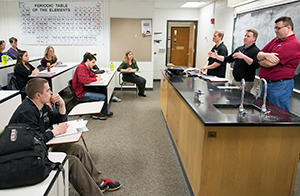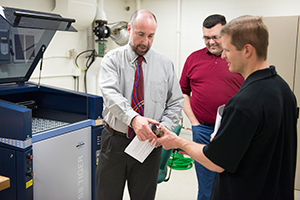EAU CLAIRE — A North American mining company with operations in Wisconsin is investing more than $50,000 annually in a new Responsible Mining Initiative being established at the University of Wisconsin-Eau Claire.
Unimin announced this month that it will invest the monies in summer internships, scholarships and grants specifically designated for UW-Eau Claire geology students.
UW-Eau Claire students selected for two summer internships with Unimin will earn $4,500 per month, or $13,500 for the summer. One student will be hired as a geology intern working in the company’s Tunnel City mining operation, while the second student will work as an environmental intern at the company’s offices in Mankato, Minn.
“This is an incredible opportunity for our students to gain valuable experience while also earning a significant stipend that will help them pay for college,” said Dr. Kent Syverson, co-architect of the Responsible Mining Initiative and chair of UW-Eau Claire’s geology department. “This kind of investment in internships specifically for UW-Eau Claire geology students is a major commitment to our program on the part of Unimin.”

Representatives from Unimin talk with a geology class about the new internships and scholarships they are creating specifically for UW-Eau Claire geology majors.
The company also has established several scholarships for UW-Eau Claire geology students. Five $1,000 scholarships will be awarded to incoming freshman geology majors, and four $2,500 scholarships will be available to sophomore geology majors.
Unimin officials say they expect the internships and scholarships to be offered yearly to UW-Eau Claire geology students.
In addition, the company announced that this year it will give $500 to every geology student who enrolls in the geology department’s summer field camp, which takes 20 students to Montana for three weeks of geological field work.
“Unimin is very excited to be part of UW-Eau Claire’s Responsible Mining Initiative,” Chris Axness, plant manager for Unimin’s Tunnel City sand mining operation, said during a campus visit that allowed him to talk with students and faculty. “With its emphasis on using evidence-based information to minimize environmental impacts from mining, this is exactly the kind of program we want to support.”
The company’s decision to provide ongoing scholarships and internships specifically for UW-Eau Claire students reflects the strength of the university’s reputation for preparing its students to succeed after graduation, said Dr. Mike Carney, associate vice chancellor for curriculum, internationalization and immersion
“Unimin’s investment in UW-Eau Claire demonstrates that they see the quality of our geology program and the students it produces, and that those students are great candidates to be their next generation of employees,” Carney said.
UW-Eau Claire began establishing its Responsible Mining Initiative after receiving funding in fall 2013 from the UW System Economic Development Incentive Grant program. The mining initiative received $451,000 in grant monies to focus on workforce development to meet the needs of the environmental consulting industry and the emerging mining industry.

Unimin representatives talk with Dr. J. Brian Mahoney (left), professor of geology, while touring the geology department during a recent campus visit.
Through outreach, education and internships, the initiative will provide a comprehensive educational program in economic mineral resources, responsible mining practices, environmental protection and governmental regulation, Syverson said.
Modern mining is a highly complex process with many regulations intended to minimize environmental impacts, said Syverson, who is regularly consulted by counties and companies in Wisconsin and beyond regarding the environmental impact of mining.
“It’s vital that resources are extracted in an environmentally safe and low-impact manner, and responsible mining operations are a major focus in the modern mining and natural resources industry,” Syverson said. “Responsible mining requires professionals with backgrounds in a range of science fields including geology, hydrogeology, restorative ecology and regulatory policy, as well as strong communication skills. But a dedicated program that provides the necessary training has not existed in the Upper Midwest.”
UW-Eau Claire’s program will give students a comprehensive understanding of modern mining and environmental practices in the mining and natural resources industries, preparing them for a variety of jobs in mining and environmental consulting industries as well as with governmental regulatory agencies such as the Department of Natural Resources, Syverson said.
Expanding the geology department’s paid internship program is among the goals of the mining initiative, and this partnership with Unimin will provide new opportunities for students to gain experience in the mining and environmental industries, Syverson said.
“This partnership is exactly the kind of opportunity that we envisioned when we started thinking about the Responsible Mining Initiative,” said Syverson, noting that Unimin is a Wisconsin DNR Green Tier company. “This is an incredible opportunity for our students. They will gain valuable real-world experience in a growing field and become better problem-solvers as they prepare to enter the workforce.”
The Unimin internships will give students meaningful experience in two different areas of the corporation, Axness said. The intern in Tunnel City will work in all parts of the sand-mining plant, gaining experience in all areas of operation, he said, noting that the Tunnel City plant is the largest and most modern of Unimin’s facilities. The intern will oversee some geological testing, make decisions and communicate with colleagues about a range of issues, all skills that will help them to be more successful working in industry after graduation, he said.
The intern in Minnesota will work in the environmental affairs department, Axness said. That intern will be engaged in environmental studies, researching regulations, and interacting with regulatory and compliance agencies, he said.
The environmental affairs intern will interact with Unimin executives as well as professionals from a variety of environmental agencies and organizations, Axness said. Those kinds of connections can open many doors as students begin their professional careers, he said.
“The internships will provide two different but equally rewarding experiences,” Axness said. “We expect students with different strengths and interests to be drawn to each of the positions. The internships reflect the range of opportunities available to young professionals within Unimin and within the mining industry.”
Syverson said he hopes the scholarships will help attract students to the geology program earlier in their college careers and make them more aware of professional opportunities within the mining industry.
Currently, few new freshmen arrive on campus as geology majors, Syverson said. Rather, many of the 100 geology majors discover the program when taking introductory geology classes or when they transfer from other institutions, he said.
Bringing students into the program earlier would help them graduate sooner, which woulf save them time and money, Syverson said. It also will more quickly increase the number of graduates who have the skills needed by the mining and environmental consulting industries, which are expanding in Wisconsin and throughout the Midwest, he said.
Axness said Unimin is sponsoring the students’ summer field camp this year with $500 awards because it wanted to do something for geology students who are too far along in their academic programs to benefit from the Unimin internships or scholarships.
The summer field camp is the second part of a geology sequence that consists of two three-week field courses. Field Geology 1 is held each year in New Mexico during Winterim, while Field Geology 2 students travel to Montana in the summer.
It’s those kinds of experiences and the faculty-student undergraduate research program that set UW-Eau Claire graduates apart and convinced Unimin to invest in the program and its students, Axness said.
The UW System grant is helping geology faculty lay the groundwork for a responsible mining program that focuses on economic geology, hydrogeology, restoration ecology, environmental protection and public policy, Syverson said.
“The responsible mining program will produce creative, scientifically literate graduates who can make a positive difference in the mining, environmental and regulatory industries,” Syverson said. “We’re thrilled that Unimin sees the value of what we are doing and is supporting our efforts in a way that will immediately benefit our students.”
